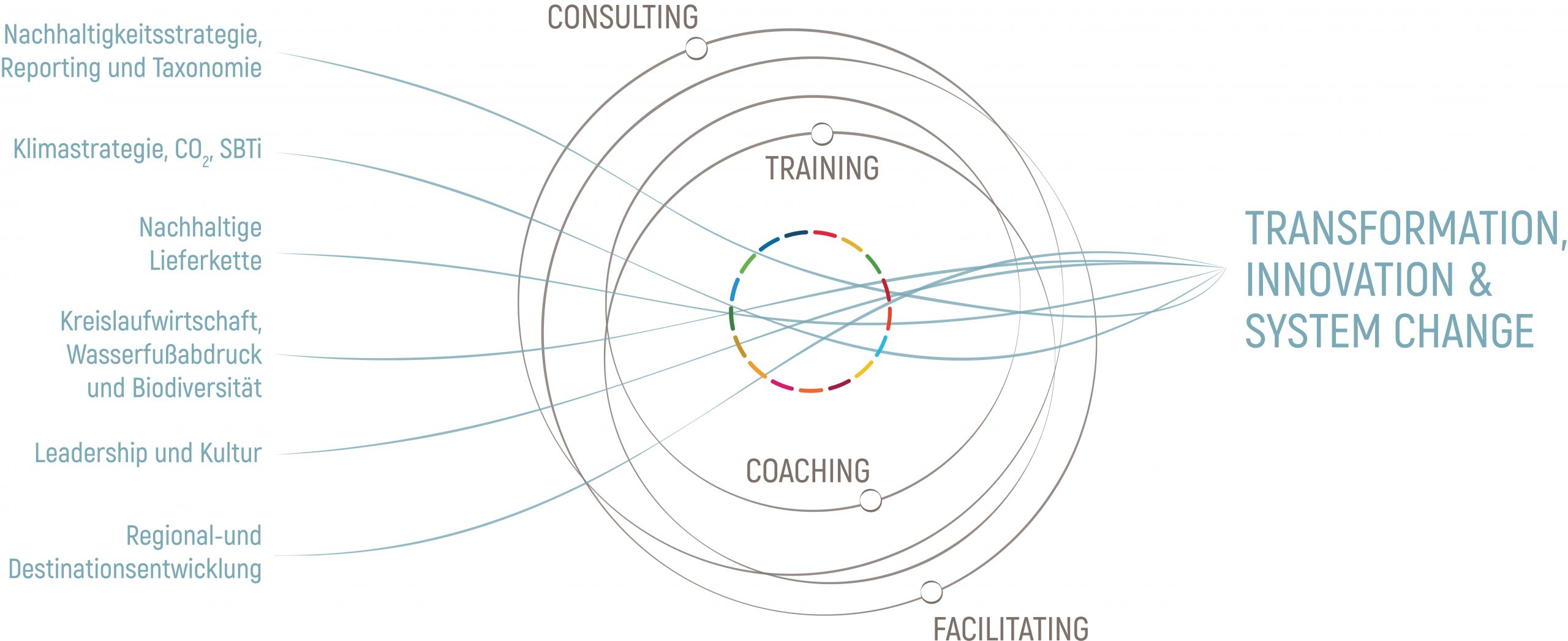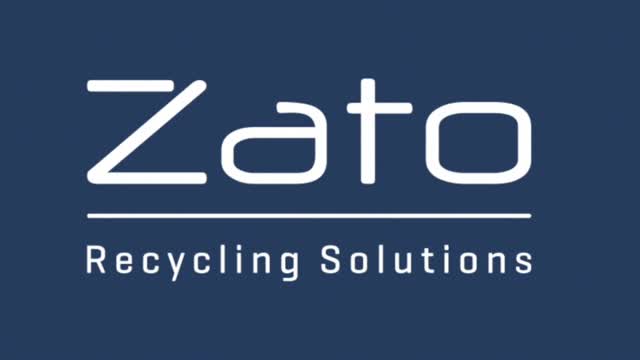THE RIGHT CLIMATE STRATEGY
FOR YOUR COMPANY
/ OUR OFFER
CLIMATE STRATEGY
CONSULTATION
WHY IT TAKES THE RIGHT PARTNER TO ESTABLISH A CLIMATE STRATEGY
Corporate sustainability is a complex issue and it is often difficult to find the right path and keep track of the various rules, regulations and laws.
However, working with Terra Institute as a sustainability consultancy can help companies find the right set of regulations and the right approach for them. In this way, they can achieve long-term sustainable development that adds value to the company, its employees and the system as a whole.
WHAT DOES TERRA DO?
As a competence centre for innovation and sustainability, we provide holistic advice and support to companies, individuals and regions that want to make an active contribution in the global shift towards sustainability.
We offer
- Consulting
- Coaching
- Training
- Facilitating
- Growth, Transformation

From the basic workshop to the development of an individual sustainability strategy with a view to the new sustainability reporting obligation, we accompany you on the path of transformation to business model innovation.
WHAT DOES CLIMATE STRATEGY CONSULTING BY TERRA LOOK LIKE?
For all necessary steps of the transformation, we have solutions and products ready, which we have developed during our more than 10 years of experience in sustainability consulting. Among others:
- the basic sustainability workshop
- the development of a sustainability strategy
- the sustainability reporting according to official standards
With the framework of the Sustainable Development Goals (SDGs) adopted by the United Nations in 2015 and the taxonomy and the European Green Deal as the legal basis, we cognitively have all the prerequisites to counteract climate change and, where this is no longer possible, to work on climate adaptation.
Within this framework, we also support companies in developing a climate strategy, often based on the Science Based Targets. Together with the company, our team of experts define the most important goals and supports the company in drawing up a roadmap for achieving these goals.

THE COMPANIES
THAT HAVE CHOSEN US


































HOW DOES THE CLIENT BENEFIT FROM A CLIMATE STRATEGY BY TERRA?
The development of a climate strategy by the Terra Institute is largely based on the Science Based Targets as scientifically founded goals, as they are measurable, realisable and time-limited. They are generally valid as well as internationally recognised and thus an optimal basis for a climate strategy in the company. As a result, they allow the company to position itself concretely and gain a competitive advantage, as they can generate a better reputation amongst customers, investors and other stakeholders. With Terra’s team of experts, this succeeds in promoting a long-term strategy and planning, and the company sends a concrete and immediate signal for the transition to Net Zero.
The company makes an important contribution to the transition towards sustainable economic development with a well-developed climate strategy that is implemented and continuously reviewed. In doing so, the company is taking responsibility for itself and others by contributing to the mitigation of climate change. Business plays a crucial role in sustainable development and an early decision to adopt sustainable business practices and a climate strategy as part of the overall business strategy can bring significant benefits.
This is for two main reasons:
- Doing business sustainably is better for the environment: first, addressing sustainability, and especially effectively reducing energy consumption and CO2 emissions, helps reduce the scope of climate change, which in mass supports a more stable economy, fewer natural disasters and extreme weather events, and fewer supply shortages due to droughts and pandemics.
- Doing business sustainably means being credible: On the other hand, taking sustainability seriously and deeply helps to convince the clientele. By communicating the measures taken as a company, one achieves a credible appearance in the public eye and can also engage employees beyond their daily work and win them over permanently.
We believe that successful business depends on sustainability. The Science Based Targets as a basic building block of a climate strategy are a decisive success factor here.
HOW DOES A CONSULTANCY BY TERRA WORK?
At Terra Institute we support companies
in identifying their sustainability goals and strategies,
in the implementation of effective measures to improve sustainability
and in perpetuating sustainable processes within the company.
In doing so, we take a systemic approach that looks at employee:internal relationships as well as the larger global context, thus working with a holistic perspective.
Today, we live in an increasingly complex world whose interrelationships are becoming more and more opaque. The systemic approach keeps this complexity visible and allows a company to include all perspectives and thus remain flexible in its options. In this way, we also combine classic sustainability issues of the external dimension with issues of the internal dimension.

Sustainability topics of the outer dimension are, for example
- the CO2 calculation
- the climate strategy
- the science-based targets
- reporting
Sustainability topics of the inner dimension, on the other hand, are
- talent management
- corporate culture
- communication within the company.
Through this connection, the important issues can be addressed across the board and the entire company is taken along.
To achieve this, we first clarify the needs, pain points and plans of the company and then put together a customised team for our clients. In this way, we guarantee individualised advice that can also be continuously adapted to current needs through a longer process. At the same time, the company has a permanent contact person throughout the entire process who personally accompanies and manages the process.
THE 6 MOST FREQUENTLY ASKED QUESTIONS ON CLIMATE STRATEGY
1. WHAT ARE THE PHASES OF A CLIMATE STRATEGY?
The climate strategy is one of the elementary building blocks on the way to sustainable development. It can be integrated into the process of a sustainability strategy or implemented as a stand-alone process. While the somewhat larger sustainability strategy covers all dimensions of sustainability – i.e. social, economic as well as ecological – the climate strategy focuses on the ecological dimension. As such, it covers the measurement of CO2 emissions and measures to reduce and offset residual emissions that cannot be reduced.
At Terra Institute, a climate strategy consists of several phases, each of which serves to understand where the company currently stands in terms of climate change mitigation, where it wants to go and how this can be achieved in concrete terms:
1. The analysis phase: one starts with a system analysis to understand where the company stands, and then moves on to measuring current emissions.
2. The target-setting phase: The next step is to set concrete reduction targets. For this, Terra Institute prefers to work with the Science Based Targets.
3. The definition phase: Once the science-based targets have been defined and confirmed in step 3, the next steps are worked out within the framework of the climate strategy in order to determine the conditions and necessary resources for achieving these targets.
This then involves questions such as:
- Which science-based targets do we start with?
- Who will take responsibility for achieving the science-based targets?
- Who is part of the team working to achieve the targets set?
- When will we measure to check progress?
- Who will do the measuring?
4 The elaboration phase: Once these questions have been clarified, the strategy is written down. In the further course, it will be continuously reviewed and, if necessary, adapted, just like the status of the science-based targets. In this way, a binding climate strategy is created that defines concrete actions and can also be used for external communication.
2. WHAT ARE THE SCIENCE-BASED TARGETS?
The Science Based Targets Initiative is a partnership between CDP, United Nations Global Compact, World Resources Institute (WRI) and WWF. The Science Based Targets themselves are science-based goals that are measurable, actionable and time-bound. They are based on the best available scientific evidence and allow actors to align themselves with societal sustainability goals. They are based on the remaining emission budgets until 2100 and on the basis of the UN climate protection goals. Defining and setting a company’s Science Based Targets takes place in five steps:
- Commitment to the Science Based Targets: This involves submitting a letter to the Science Based Targets Initiative stating the intention to set Science Based Targets.
- Development of the targets: In this step, initial emission reduction targets are developed in accordance with the SBTi criteria.
- Submission of targets: In this step, the previously developed targets are submitted to the SBTi for review and validation.
- Communication: Once the targets are validated, the company can publish them and also communicate them to its stakeholders.
Reporting: Even before the targets are published, work begins on the targets themselves. Reduction projects are initiated and targets are reviewed annually to understand the current status and identify potential barriers. Current emissions and measures to reduce, offset and avoid emissions are continuously communicated internally and externally.
3. WHY DO COMPANIES NEED A CLIMATE STRATEGY NOW?
Offsetting is not a sensible alternative to reduction and, above all, isolated individual projects do not achieve their goals. Companies must reduce their emissions consistently and on the basis of scientific targets, also because the Paris Agreement obliges all signatory countries to set national emission reduction targets (so-called Nationally Determined Contributions, NDCs). The agreement thus requires all sides to significantly reduce their greenhouse gas emissions and in this way also ends the simple cross-border trade of securitised CO2 credits. Companies are thus decisively responsible for reducing the emissions of their value chain to almost zero. This can only be achieved with a sound climate strategy that sets targets, plans measures, and provides a framework.
4. SHOULD A COMPANY COMMUNICATE ITS CLIMATE STRATEGY?
Businesses can use their influence and voice to strengthen the climate movement in the business community, help others meet their commitments, and push regulators for progressive legislation to mitigate and adapt to the climate crisis. From our point of view, it is not expedient to make individual products climate neutral, as this sends misleading signals to consumers, for example.
However, we support the idea of climate responsibility, which makes it possible to take responsibility for the production of a product or the company’s own emissions and to make the climate impact visible to consumers. This can be put into practice with so-called contribution claims, for example.
Here, it is no longer primarily the company’s own emissions that are offset and products are described as climate-neutral. Instead, it is transparently stated on the product or on the company website how high the remaining emissions are for consumers after as many emissions as possible have been reduced. At the same time, it is also communicated here in which emission reduction projects the company invests. Companies that take this approach are less exposed to the risk of greenwashing accusations because they communicate credible and realistic efforts.
5. WHAT ARE THE EU'S CLIMATE TARGETS?
In addition to the Paris Agreement, there are other goals and targets for companies to consider. These include the European Union’s climate targets set out in the Green Deal. In December 2019, the European Commission presented the “European Green Deal”. The concept aims to reduce net greenhouse gas emissions in the European Union to zero by 2050. At the EU summit in December 2020, the heads of state and government also decided to tighten the medium-term climate target. By 2030, pollutant emissions in the European Union are to be reduced by 55% compared to the reference year 1990, because climate change and environmental degradation are existential threats to Europe and the world. Therefore, Europe needs a new growth strategy if the transition to a modern, resource-efficient and competitive economy is to succeed, in which:
- no net greenhouse gas emissions are released by 2050.
- economic growth is decoupled from resource use.
- no one, neither people nor region, is left behind.
6. WHAT IS THE EUROPEAN GREEN DEAL?
The European Green Deal is a roadmap for a sustainable EU economy. It aims to achieve this goal by seeing climate and environmental challenges as opportunities in all policy areas and by making the transition equitable and inclusive for all. Therefore, the European Green Deal includes a roadmap of measures:
- to promote a more efficient use of resources through the transition to a clean and circular economy
- to restore biodiversity and combat pollution.
It identifies what investments are needed and how they can be financed, and explains how a just and inclusive transition can succeed. To get there, a European climate change law has been proposed to put this political commitment into law and make it the trigger for investment. All sectors of the economy should actively contribute to climate goals. These include:
Investing in new, environmentally friendly technologies.
- Supporting industry to innovate.
- The introduction of greener, cheaper and healthier forms of private and public transport.
- The decarbonisation of the energy sector.
- Increasing the energy efficiency of buildings.
- Working with international partners to improve global environmental standards.
The EU aims to provide financial and technical support to people, businesses and regions struggling most with the transition to a green economy. This will be done through the Just Transition Mechanism, which aims to mobilise at least €100 billion in the period 2021-2027 in the most affected regions.
climate strategy – our team
Birte Erbeldinger
 Birte Erbeldinger studied agricultural sciences with a focus on soil science.
Birte Erbeldinger studied agricultural sciences with a focus on soil science.
Through her experience in agriculture and the associated production of food, she is strongly connected to a natural circular economy. At the Terra Institute, she is mainly responsible for CO2 calculations.
Matthias Zaussinger

Matthias is an environmental consultant with a strong interest in climate, sustainability and nature and species conservation. He has expertise in recycling, packaging and the hotel industry.
Matthias likes to work in a team and enjoys collaborative work. His scientific education is in sustainable resource management and climate change.
Paul Lardon

Paul Lardon is a graduate engineer in technical environmental protection. Prior to joining Terra Institute, he worked in a global environmental services company in a variety of roles.
In an in-service Master’s degree in Strategic Sustainability Management, he further developed his skills in guiding companies through transformation. His main focus at Terra is climate consulting and circular economy issues.
Ulrich Prechsl

Ulrich Prechsl holds a PhD in agricultural science and has many years of experience in sustainability, agricultural and ecosystem research.
His cooperation with politics, science and other stakeholders has sensitised him to different perspectives and needs. Data and life cycle analyses as well as climate consulting are among his competencies.
Contacts
Do you have any questions or would you like our support on your way to becoming a sustainable company?
The easiest way to get in touch with us is here!
Please note our Privacy Policy and conditions.
Thank you very much! We look forward to receiving your message!
office@terra-institute.eu
Tel. +39 0472 970 484.
-

BRESSANONE HEADQUARTERS
Terra Institute Srl
Via Sant'Albuino 2
39042 Bressanone (BZ)
Italy
INNSBRUCK OFFICE AUSTRIA WESt
Maria Theresienstr. 34
6020 Innsbruck
Austria